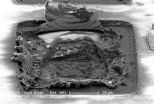(Press-News.org) INDIANAPOLIS -- A study from the Regenstrief Institute and the Indiana University Center for Aging Research has found that many older adults are hesitant to halt cancer screenings even when the screenings may no longer be beneficial or may even be potentially harmful. The study is among the first to explore older adults' perceptions of recommendations to halt screenings for breast, prostate, colon and other cancers as they age.
"Older Adults and Forgoing Cancer Screening: 'I think it would be strange'" was published Online First by JAMA Internal Medicine. "I think it would be strange" was an older adult's reaction when asked about a physician advising against a screening.
The researchers -- led by Regenstrief Institute investigator Alexia Torke, M.D., an IU Center for Aging Research scientist and an assistant professor of medicine at the IU School of Medicine -- report that many older adults feel a strong moral obligation to continue cancer screenings and that a physician's recommendation to stop screening might threaten trust in the doctor or motivate the patient to seek a second opinion.
"In this era of attention to over-testing, there is a growing recognition in the medical community that some older adults are screened for cancer when it is not beneficial or even potentially harmful to that person," Dr. Torke said. "If physicians are going to successfully communicate with their older patients about forgoing screening they, as well as other care providers, need to understand how older adults view these screenings."
In open-ended interviews with older adults with a mean age of 76, the researchers found patients viewed screening as an automatic, recommended or obligatory action. According to Dr. Torke, this confirms the success of public health campaigns in communicating the health benefits of screening. The study findings, she says, highlight the need to develop specific messages for older adults that don't undermine the messages targeted to other groups.
However, study participants seemed to respond well to the idea that screening does not make sense if the burdens -- such as pain, time requirements or stress -- can be expected to outweigh the benefits. For example, the burdens of colonoscopy were repeatedly cited as reasons not to continue with this test as the patient aged.
Participants were skeptical about hearing government panel recommendations and statistics that show that older adults may not benefit from certain screening tests. Many expressed distrust of the government or felt statistics did not apply to them.
Study participants ranged in age from 63 to 90.
"Each patient is different, but when speaking with older adults or the caregivers of those who can no longer make decisions for themselves about reducing screenings, the discussion needs to clearly outline the balance of risks and benefits for the specific individual. This approach has the greatest chance of building trust and understanding," Dr. Torke said.
INFORMATION:
In addition to Dr. Torke, who is also a faculty member of the Fairbanks Center for Medical Ethics of IU Health, co-authors of the study are Peter H. Schwartz, M.D., Ph.D., of the IU School of Medicine and IU Center for Bioethics; Laura R. Holtz, B.S., and Kianna Montz, M.A., of the Regenstrief Institute and the IU Center for Aging Research; and Greg A. Sachs, M.D., of the Regenstrief Institute, IU School of Medicine and IU Center for Aging Research.
The study was funded by a grant (P30AG024967) from the National Institute on Aging.
JAMA Intern Med. Published online March 11, 2013. doi:10.1001/jamainternmed.2013.2903.
Regenstrief and IU study investigates older adults' views on cancer screening
2013-03-12
ELSE PRESS RELEASES FROM THIS DATE:
Analysis of ASCO's QOPI® data finds significant improvement in performance on metrics for quality oncology care
2013-03-12
In this News Digest:
Summary of a study being published online March 11, 2013, in the Journal of Clinical Oncology, analyzing self-reported data from 156 outpatient oncology practices participating in the American Society of Clinical Oncology's Quality Oncology Practice Initiative (QOPI®) showing significant improvements in performance on certain measures for quality oncology cancer care over a four-year period.
Overall, mean normalized performance scores from participating practices rose from 71 to 85 percent between 2006 and 2010; improvements were especially profound ...
Monsoon failure key to long droughts in Southwest
2013-03-12
Long-term droughts in the Southwestern North America often mean failure of both summer and winter rains, according to new tree-ring research from a University of Arizona-led team.
The finding contradicts the commonly held belief that a dry winter rainy season is generally followed by a wet monsoon season, and vice versa.
The new research shows that for the severe, multi-decadal droughts that occurred from 1539 to 2008, generally both winter and summer rains were sparse year after year.
"One of the big questions in drought studies is what prompts droughts to go ...
Lunar impacts created seas of molten rock, research shows
2013-03-12
PROVIDENCE, R.I. [Brown University] — Early in the Moon's history an ocean of molten rock covered its entire surface. As that lunar magma ocean cooled over millions of years, it differentiated to form the Moon's crust and mantle. But according to a new analysis by planetary scientists from Brown University, this wasn't the last time the Moon's surface was melted on a massive scale.
The research, led by graduate student William Vaughan, shows that the impact event that formed the Orientale basin on the Moon's western edge and far side produced a sea of melted rock 220 ...
Remote clouds responsible for climate models' glitch in tropical rainfall
2013-03-12
It seems counterintuitive that clouds over the Southern Ocean, which circles Antarctica, would cause rain in Zambia or the tropical island of Java. But new research finds that one of the most persistent biases in global climate models – a phantom band of rainfall just south of the equator that does not occur in reality – is caused by poor simulation of the cloud cover thousands of miles farther to the south.
University of Washington atmospheric scientists hope their results help explain why global climate models mistakenly duplicate the inter-tropical convergence zone, ...
Long-suspected cause of blindness from eye disease disproved
2013-03-12
(SALT LAKE CITY)—Vision scientists long have thought that lack of very long chain fatty acids in photoreceptor cells caused blindness in children with Stargardt type 3 retinal degeneration, an incurable eye disease. But researchers at the University of Utah's John A. Moran Eye Center have shown in a new study that lack of these fatty acids does not cause blindness, meaning that the search for the mechanism that robs sight from children with the disease must start anew.
Researchers led by David Krizaj, Ph.D., associate professor of ophthalmology and visual sciences at ...
Common erectile dysfunction drug not helpful for heart failure patients, study finds
2013-03-12
SAN FRANCISCO -- A commonly used erectile dysfunction drug, sildenafil, doesn't help patients who have heart failure with preserved ejection fraction, a condition in which the heart's lower chambers are stiff and cannot relax and fill fully between beats. That is the finding of the RELAX study, presented today at the American College of Cardiology's 62nd Annual Scientific Session and simultaneously published in The Journal of the American Medical Association. The study's lead author called the results disappointing.
Sildenafil, a phosphodiesterase-5 inhibitor, had shown ...
Astronomers conduct first remote reconnaissance of another solar system
2013-03-12
Researchers have conducted a remote reconnaissance of a distant solar system with a new telescope imaging system that sifts through the blinding light of stars. Using a suite of high-tech instrumentation and software called Project 1640, the scientists collected the first chemical fingerprints, or spectra, of this system's four red exoplanets, which orbit a star 128 light years away from Earth. A detailed description of the planets—showing how drastically different they are from the known worlds in the universe—was accepted Friday for publication in The Astrophysical Journal. ...
Creating indestructible self-healing circuits
2013-03-12
PASADENA, Calif.—Imagine that the chips in your smart phone or computer could repair and defend themselves on the fly, recovering in microseconds from problems ranging from less-than-ideal battery power to total transistor failure. It might sound like the stuff of science fiction, but a team of engineers at the California Institute of Technology (Caltech), for the first time ever, has developed just such self-healing integrated chips.
The team, made up of members of the High-Speed Integrated Circuits laboratory in Caltech's Division of Engineering and Applied Science, ...
Epigenetics mechanism may help explain effects of mom's nutrition on her children's health
2013-03-12
This press release is available in Spanish.
Pioneering studies by U. S. Department of Agriculture-funded research molecular geneticist Robert A. Waterland are helping explain how the foods that soon-to-be-moms eat in the days and weeks around the time of conception—or what's known as periconceptional nutrition–may affect the way genes function in her children, and her children's health.
In an early study, Waterland and co-investigators examined gene function of 50 healthy children living in rural villages in the West African nation of The Gambia. The study has shaped ...
Study shows how one insect got its wings
2013-03-12
COLUMBUS, Ohio – Scientists have delved deeper into the evolutionary history of the fruit fly than ever before to reveal the genetic activity that led to the development of wings – a key to the insect's ability to survive.
The wings themselves are common research models for this and other species' appendages. But until now, scientists did not know how the fruit fly, Drosophila melanogaster, first sprouted tiny buds that became flat wings.
A cluster of only 20 or so cells present in the fruit fly's first day of larval life was analyzed to connect a gene known to be active ...




